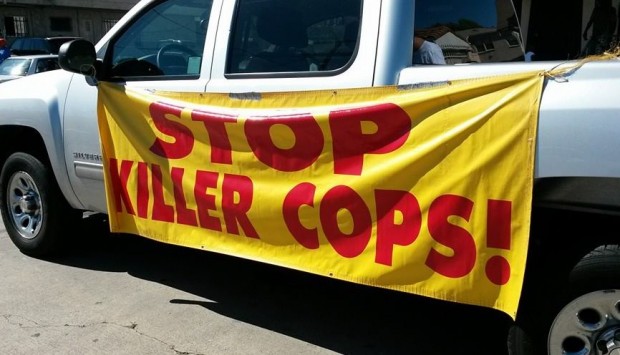 It’s official. Supreme Court has decided that no, Arizona can NOT go over the heads of the rest of the country. Even. Justice Scalia called BS on that!
It’s official. Supreme Court has decided that no, Arizona can NOT go over the heads of the rest of the country. Even. Justice Scalia called BS on that!
Reuters
The U.S. Supreme Court on Monday struck down an Arizona law that required people registering to vote in federal elections to show proof of citizenship, a victory for activists who said it had discouraged Native Americans and Latinos from voting.
In a 7-2 vote, the court, in an opinion written by conservative Justice Antonin Scalia, ruled the voter registration provision of the 2004 state law was trumped by a federal law, the 1993 National Voter Registration Act.
The state law was opposed by the Mexican American Legal Defense and Education Fund and Indian tribes. They said it deterred legal voters who did not have the required paperwork from registering to vote.
It was another setback for the Republican leadership of a state, bordering Mexico, that has tried to crack down on illegal immigrants at a time when Hispanics represent the largest U.S. minority at nearly 17 percent of the population.
Both major political parties in Congress, aware of the increasingly influential Latino vote nationally, are trying to overhaul immigration laws with a bill that could provide a 13-year path to citizenship for 11 million illegal immigrants.
At the same time, the high court made clear that Arizona could still have other ways to assert its argument that it should be allowed to ask for proof of citizenship. That would be the subject of separate litigation, the court said.
“It is a bit of a mixed bag, but at the end of the day it does reaffirm the absolute right to vote,” said Arizona state Senator Steve Gallardo, a Democrat.
Gallardo said the law unfairly made it seem as if there was massive fraud among Latino voters, which has never been proven. For a year, the Arizona Republican Party … (has) been using different methods to disenfranchise Latino voters,” he said.
Arizona Republican Attorney General Tom Horne, who argued the case, did not immediately respond to a request for comment.
The state’s Republican leadership had said the law was meant to fight voter fraud, but Democrats countered that Republicans who championed the measures aimed to make it harder for minority voters who tend to vote Democratic to cast ballots.
Arizona is 30.1 percent Hispanic, according to 2011 census statistics. Its native American population is 5.2 percent compared with 1.2 percent nationwide.
RULING AFFECTS THREE OTHER STATES
The ruling will affect three other states – Georgia, Alabama and Kansas – that have similar laws, and prevent others that may have wanted to follow suit from enacting legislation along the same lines.
Federal law requires prospective voters to provide one of several possible forms of identification, such as a driver’s license or a passport, but no proof of citizenship is needed. Would-be voters simply sign a statement saying they are citizens.
The top court battle was the latest for Arizona’s Republican leadership.
Last year, the court upheld one provision of the state’s crackdown on illegal immigrants but threw out three other parts, handing a partial victory to President Barack Obama in his challenge to the law. Critics of that 2010 Arizona law argued it could lead to illegal racial or ethnic profiling of Hispanics.
In Monday’s majority opinion, Scalia said the state law was pre-empted by language in the federal statute saying that states must “accept and use” a federal registration form. The state law ordered officials to reject the form if there was no accompanying proof of citizenship.
The two dissenters, Justices Clarence Thomas and Samuel Alito, said in their separate opinions that states alone have the authority to decide voter qualifications.
In outlining the limitations of the ruling, Scalia focused on the role of the U.S. Election Assistance Commission, a federal agency that oversees changes to state voter registration procedures. The commission rejected the Arizona plan, prompting several justices to ponder during oral arguments in April why the state did not file a lawsuit challenging the decision.
Scalia said Arizona could still ask the commission to include a citizenship provision on the federal form in the future and could challenge the current form in separate litigation. “That alternative means of enforcing its constitutional power to determine voting qualifications remains open to Arizona here,” he wrote.
Scalia noted the commission already has granted Louisiana permission to require additional materials as proof of identification if an applicant does not have a driver’s license, identification card or Social Security number.
Rick Hasen, an election law expert at the University of California, Irvine, School of Law, said Arizona could win future litigation on the issue in light of the Louisiana decision.
The case began when Arizona residents, civil rights groups and Indian tribes sued to challenge the state measure, which they said discriminated against otherwise eligible voters, among them members of more than a score of Native American tribes across the rugged desert state, some of whom struggle to meet additional requirements.
Nina Perales, vice president of litigation at the Mexican American legal defense group that opposed the law, said the ruling “sends a strong message that states cannot block their citizens from registering to vote by superimposing burdensome paperwork requirements on top of federal law.”


More Stories
What happened to Jared Taylor?
Had a great time at the RNC (mostly because we’re nuts)!
All Out for April 23, Stone Mountain Georgia